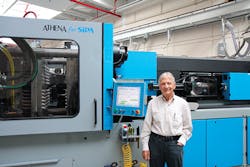Athena now taking orders for its customized presses
Robert Schad started a small machine shop in Toronto in 1953 that eventually became Husky Injection Molding Systems Ltd., a global manufacturer of injection molding machines, hot runners and PET preform molds. Schad sold his Husky shares in 2007 and the following year launched Athena Automation Ltd.
Schad, 85, this year broke ground on a $40 million plant next to Athena's current Toronto area headquarters to build customized injection presses and develop lights-out automation technology. Athena has about 70 employees.
Athena also has a partnership with the Italian machinery maker Sipa SpA to sell Athena's PET platform.
Schad recently answered questions for Plastics Machinery Magazine.
If you could solve one problem for injection molders, what would it be?
Schad: Automating operation whenever possible to a lights-out status. Automation has been a factor in the reshoring that is now happening in North America. Lights-out automation is the ultimate step in reducing manufacturing costs.
How many injection molding machines does Athena Automation currently have running at molding companies?
Schad: We have shipped a number of beta machines that are being validated and are starting to fill orders for machines to be delivered this fall and next year.
Please describe your vision for a "highly customizable platform."
Schad: A basic machine that answers the fundamental requirement for mechanical and process accuracy; a rigid platform with options such as preform package, stack mold carrier, cube, multi-material, robotics, in-mold-assembly.
How will the modular, highly customizable hybrid Athena injection molding machines compare in price and operating costs to comparable machines from other manufacturers?
Schad: We'll be competitive in pricing and operation costs with high-end manufacturers' electric machines.
How many patents have you earned since starting Athena in 2008?
Schad: We have applied for more than 50 patents.
When do you expect Athena to become profitable?
Schad: In three to five years, considering the new plant we are currently building.
How will you convince customers that Athena can be their long-term supplier?
Schad: We're setting Athena up for the long-term – under family ownership with involvement of employees. And we're making long-term investments in facilities and technology.
What are you doing to build a global capability for service, spare parts, installation and training?
Schad: With the exception of PET, which is globally handled by SIPA, we're first focusing on the Americas with local service support.
Will Athena build its own plant automation components?
Schad: We are concentrating on what can be done with the machine and then work with other suppliers when assembling systems.
Are you pleased with Athena's progress thus far?
Schad: Yes. I am most pleased with the team we've built and the reception of our product in the market.

